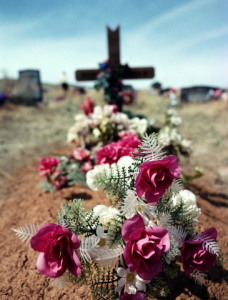‘O God, great and omnipotent judge of the living and the dead, we are to appear before you after this short life to render an account of our works. Give us the grace to prepare for our last hour by a devout and holy life, and protect us against a sudden and unprovided death. Let us remember our frailty and mortality, that we may always live in the ways of your commandments. Teach us to “watch and pray” (Luke 21:36), that when your summons comes for our departure from this world, we may go forth to meet you, experience a merciful judgment, and rejoice in everlasting happiness. We ask this through Christ our Lord. Amen.’ (Prayer for a happy death, Catholic Online).
These, or similar words, are ones we might pray for a friend or loved one who is suffering from a grave illness, or in danger of death from old age. We know that death is the conclusion of our earthly life and is a direct consequence of sin. Death is actually contrary to God’s original plan for us but through our fallen nature we let sin, suffering and death enter the world.
But Jesus came so that we might have life! Rather than describing death as the conclusion of our earthly life, it is perhaps more fitting to describe death as God calling us to himself, calling us home to him. ‘Death is the end of man’s earthly pilgrimage, of the time of grace and mercy which God offers him so as to work out his earthly life in keeping with the divine plan, and to decide his ultimate destiny.’ (CCC 1013)
The opening sentence of the quote above from the Catechism of the Catholic Church is a most eloquent way of explaining just what our earthly life is. It is a pilgrimage. We have been given this earthly life as a time to prepare for our eternal destiny.
As Catholics of course we desire to spend eternity with God in Heaven, and so obviously, the best way to achieve such paradise is to lead good and holy lives and pray for God to transform us. The effort we put into leading holy lives will help us achieve a ‘happy death’.
But just what is a ‘happy death’ and how can we achieve it? There are those in the secular world who believe that a ‘happy death’ is one where we can choose our own end. Euthanasia is promoted as being a happy and merciful death where the long suffering can choose to go out quietly with the aid of drugs. This is not a happy death, indeed this is really almost the opposite.
To put it simply, a ‘happy death’ is to die in God’s mercy and grace. To pass over into the next life with no sins remaining on our conscience and no despair or anguish in leaving this life is perhaps a good way to describe it. To go to God free from sin, and accepting that God wills us home with him now.
It may be that God is calling us to him when we still have young children, or there are other things we had wanted to do in this life, but rather than being resentful or fighting against God’s plan for us, a happy death is really a sign of our loving obedience to God. To willingly and readily accept that our earthly pilgrimage is over and look forward with joyful anticipation to the eternal life Jesus attained for us.
And so, the Sacrament of Anointing actually gives us those graces we need to achieve a ‘happy death’. Through this Sacrament we are given strength, peace and courage to overcome the difficulties that come with a grave illness and the danger of death (cf. CCC 1520).
Thus in our final bodily suffering we are given the trust and faith in God necessary for us to resist the feelings of despair and anguish, and instead we can achieve the healing of our soul. Then, when we meet God in the next life, we will have a soul now free from blemish and though we may still have some purgation as a result of our sins, our soul belongs to Jesus Christ and not to sin itself.
In this way when we stand before Jesus at the hour of judgment, he will know that though we sinned, ultimately we desired to be with him and tried our flawed best to lead a holy life.
And so, the Sacrament of Anointing is: ‘A preparation for the final journey. If the sacrament of anointing the sick is given to all who suffer from serious illness and infirmity, even more rightly is it given to those at the point of departing this life; so it is also called sacramentum exeuntium (the sacrament of those departing). The Anointing of the Sick completes our conformity to the death and Resurrection of Christ, just as Baptism began it. It completes the holy anointings that mark the whole Christian life: that of Baptism which sealed the new life in us, and that of Confirmation which strengthened us for the combat of this life. This last anointing fortifies the end of our earthly life, like a solid rampart for the final struggles before entering the Father’s house.’ (CCC 1523)
Originally posted 2014-12-18 22:34:45.


Thanks, Emily. Bears thinking about!